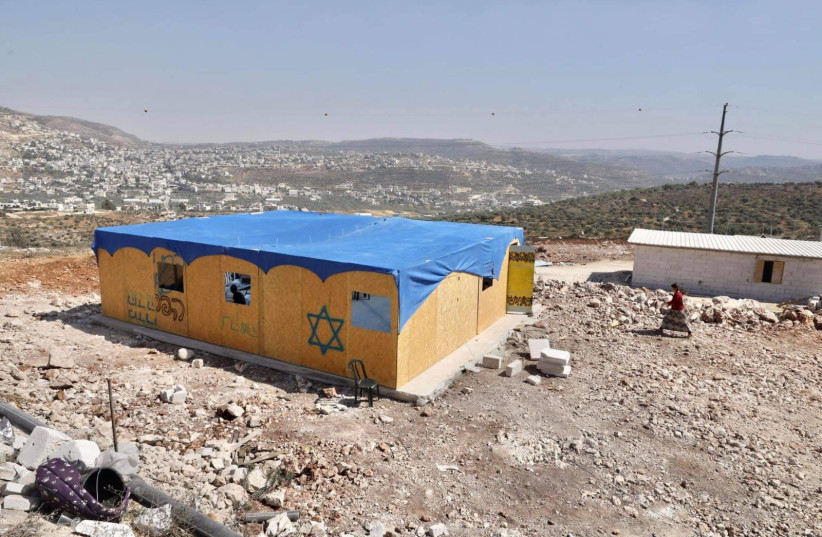West Bank settler outposts can legally be hooked up to the electricity grid, according to a Justice Ministry opinion that could help stabilize the coalition and make a new election less likely.
“I welcome the opinion of the government’s Deputy Attorney-General (Civil) Carmit Yulis, which in principle allows young settlements that can be authorized in the future to be connected to the electricity grid,” Justice Minister Gideon Sa’ar tweeted on Tuesday.
According to the brief opinion Yulis authored on Thursday, the possibility of authorizing illegal communities in Area C of the West Bank was discussed on February 23. Her opinion was published only on Tuesday.
The opinion she penned did not focus either on Israelis or Palestinians. Instead, Yulis wrote that the arrangement under discussion “would be applied equally to all residents of Area C.”
An electricity hookup is viewed as a step forward in the authorization of the outposts, known to the Right as the “young settlements.”

It was also one of the demands put forward by MK Nir Orbach (Yamina) on Thursday as a precondition for his agreement to remain in the coalition. The coalition lost its governing majority last week when Yamina MK Idit Silman resigned from the coalition leaving it with only 60 seats in the 120-member parliament.
Given Left-wing, Palestinian and international objections to the legalization of the outposts, this demand was considered the most difficult to fulfill. Defense Ministry Benny Gantz has the final say over any decision regarding the outposts, but the legal opinion will make it easier for him to acquiesce to the demand.
A number of bureaucratic steps must take place before the outposts can receive electricity, including setting criteria for how many of the 100 fledgling communities would be eligible to be connected to the grid.
It is also expected that Gantz would simultaneously approve electricity for 10-15 illegal Palestinian villages in Area C of the West Bank, a move that the Right opposes. Final authorization of all electricity hookups rests with Gantz.
The Left, the Palestinians and the international community have traditionally opposed any move that would legitimize the outposts, such as receiving electricity. Full authorization of the new communities would expand Israel’s foothold in the West Bank.
In a Zoom event hosted by the Washington Institute, Gantz spoke of his commitment to improving life for both Palestinians and Israelis in Area C.
“We need to move from the struggle of who will not be living here to how we will both be living here,” Gantz said. “We continue to build for Israelis and Palestinians in a lawful manner and at the right time.”
Knesset Foreign Affairs and Defense Committee Chairman MK Ram Ben Barak told Army Radio that he believed all illegal construction should be destroyed. Until then, those who live there should be provided electricity, particularly if there are children in the structures.
Ben Barak said there is no connection between electricity and the eventual razing of the buildings: “They [structures] will be evacuated [both] if they have electricity and if they don’t.”
MK Michal Rozin said she opposed the move, even if it meant providing electricity for illegal Palestinian homes. Such a step, she said, will not help restore calm to the West Bank, and should only occur as the result of a diplomatic agreement.
The left-wing NGO Peace Now warned that providing electricity to the outposts would reward them for criminal behavior, and “would be the final bankruptcy of the rule of law. A reformed state stops criminals and exhausts the law, it does not award them prizes.”
Gantz, Peace Now said, must now decide if “he stands by the Israeli interest, or succumbs to the political blackmail of messianic criminals who want to drag us into a binational state.”
The Land of Israel Caucus, made up of right-wing opposition politicians who want to dissolve the coalition, warned that it was dangerous to take steps to support the PA and President Mahmoud Abbas. It warned against trading “territory for electricity.”
“Connecting the [Arab] outposts to electricity in exchange for the connection of the young settlements actively renders assistance to the PA’s plan to take over the territories of Judea and Samaria,” the caucus said, and that this was an extremely dangerous step.
Politicians in the right-wing Yamina party, including Orbach, said he welcomed “the important decision taken by Justice Minister Sa’ar’s office, as one more stage in the connection of the young settlements to electricity.”
Orbach’s ultimatum also included a request to restore daycare subsidies for children of yeshiva students. Finance Minister Avigdor Liberman, who had cut the funding, has agreed to delay any action until 2024.
Orbach’s other ultimatum, convening the Higher Planning Council for Judea and Samaria, has yet to be met.
On Tuesday, the coalition faction heads held their first meeting since Silman’s resignation last week.
Acting coalition chairman MK Boaz Toporovsky recalled that this government was formed last year to heal the nation, intended to be a coalition that united rather than divided, and which – for the first in Israel’s history – represented all segments of Israeli society.
“Together we worked against incitement, extremism, violation of the rule of law and strengthened democracy,” Toporovsky said. “We must not stop here. We must continue to work together so that we can continue to do positive things for the country and its citizens.”
